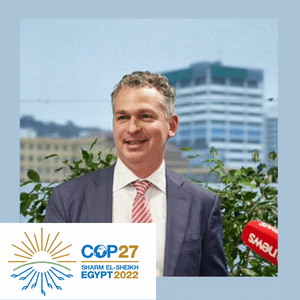Ahead of COP27 in Egypt next month, SBC talks to NZ Businesses who will be on the ground in Sharm el-Sheikh to find out why they are going, what they are hoping to achieve and what they think a successful outcome might look like.
This week we get insights from Craig Weise, Chief Executive of the New Zealand Green Investment Finance.

Craig leads New Zealand Green Investment Finance (NZGIF), New Zealand’s Crown-backed green investment bank, charged with accelerating investment in New Zealand’s low carbon future.
NZGIF’s investment approach, flexible mandate and long-term horizon help it to unlock and create investment opportunities, drive impact and provide access for others to climate-friendly investments. As a direct investor in its own right, it is focused on active market participation from the front, building a portfolio that illustrates the breadth of low-carbon investment opportunities.
Craig, NZ Green Investment Finance has been going to COPs for a number of years now – what is it about these international meetings that is of most value to you?
Well. . .COP is not just the UN’s climate change conference, it is the world’s premiere climate summit. What once began as a meeting of sovereign nations has now evolved to be the centre of all things related to climate change, attended by governments, corporates, financial institutions, investors, climate solutions companies, civil society, and NGOs. Entirely additional to what is going on with the official COP agenda, the event is an annual stocktake of ideas, solutions, actors, and state of play for all things climate-related.
For NZGIF, COP provides a rich and unique environment for us to understand what is happening in the world. This is vital for us as a long-term investor supporting change away from the status quo. The wider COP format enables mass uptake across the spectrum of new ideas, information and relationships of relevance to us. It’s an opportunity to connect with our peers, other market participants, and senior climate actors all in one place that is difficult to replicate in any other single event.
COP26 had a huge build up and felt like a major milestone event. The lead up to COP27 has seemed more subdued. What are your thoughts on where the global climate response is now vs a year ago at Glasgow? Where do you hope we will be by COP28?
It’s been a tough year for the world, full of distractions, uncertainty, and volatility arising from war in Europe, the overhang of COVID, and the global macroeconomic environment. As Europe in particular has been a global leader in supporting and financing climate transition, this has naturally had some impact, particularly on the energy front.
However, climate-related focus and activity are becoming increasingly embedded in society across individuals, households, businesses, and investors. The pace of change brought about by this wider social adoption has continued, so it will be really interesting to assess state of play while there. Tipping points that are climate friendly don’t (and won’t) occur equally across the globe or in any single economy at the same time, but fossil fuels are, of course, a common factor for everyone at present.
Glasgow was the finance COP, so for me, significant developments in global climate finance made COP26 particularly exciting. COP27 is looking at adaptation and financing the response to the effects of climate change … as to where I would like us to be by COP28. . .well, much further along (!) is the short answer, but I promise a more fulsome response on my return, once I’ve completed my own stocktake.
What are the three top outcomes you are seeking from your attendance at COP27?
The climate space is dynamic and rapidly evolving, across technologies, changing business models, regulatory standards, consumer preferences, or developments in finance. So I look to COP27 for:
- Climate solutions. Finding innovative technologies, business models or partners relevant to NZ that we can adopt or import to help accelerate decarbonisation. Being aware of emerging options informs our investment outlook and helps us, our portfolio companies, and others we work with look to the future.
- Insights. Gaining insight into the experiences of others dealing with these issues at pace – understanding what’s working, what’s not, and what’s waiting around the corner.
- Connectivity. Building NZGIF’s reputation in the market. As our national green investment bank, it’s important for us to build and manage a reputation and footprint in the global market, to help others understand what NZ is doing and to find additional sources of capital. The green banking model we follow is highly relevant in NZ and globally, but relatively new. Like all new things, it takes a little while to be fully understood, so it’s crucial to constantly help develop that understanding in others to unleash its full potential and build our opportunity set.
Find out more about NZGIF’s work here.

